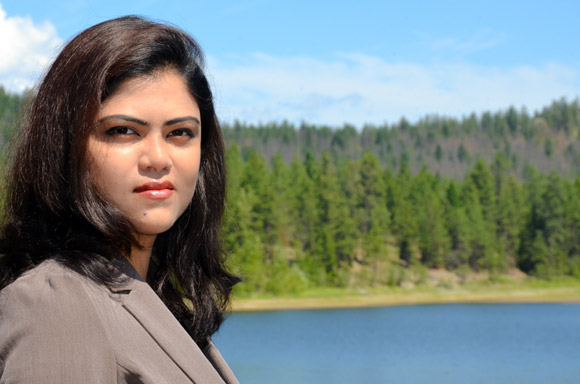
UBC PhD candidate Nilufar Islam, pictured at Kelowna’s McKinley Reservoir, is studying the concept of booster chlorination along water distribution networks in a way to get clean water into every home in BC.
Engineer is on a mission to ensure distribution networks deliver clean water
Nilufar Islam was a high-school student in Bangladesh when Walkerton, Ontario made international news for E. coli-infected water that killed seven people in May 2000.
Little did she know at that time, the Walkerton tragedy would shape her educational future.
Islam, a PhD candidate who earned her master’s degree in civil engineering at UBC’s Okanagan campus in 2010, recently won the Alexander Graham Bell Canada Graduate Scholarship grant from the Natural Sciences and Engineering Research Council (NSERC). The $70,000 award is presented annually to top-ranked, post-graduate students based on their academic excellence, research potential, communication skills, and leadership abilities.
The award helps Islam continue her research into methods to improve water distribution networks. She is determined to find a way to ensure all households, especially those in small communities, receive safe drinking water.
“We need to prevent another Walkerton,” Islam says. “The staff at Walkerton was not well trained and that’s often the case in small municipalities. We are looking for a way to ensure water quality along the entire distribution network is healthy without putting a strain on a municipality’s technology or its limited human resources.”
Indeed, in Walkerton seven people died, thousands became ill, and two Walkerton Public Utilities Commission employees were prosecuted on criminal charges.
Chlorination, Islam explains, is needed to keep drinking water safe. But once it is chlorinated, naturally-occurring organic materials in the water react with the chlorine and produce chemicals called disinfection byproducts (DBPs).
High levels of DBPs in drinking water have been associated with health risks such as cancer and reproductive disorders. Finding the correct balance between microbial and chemical water quality is essential, and Islam says quite often water quality diminishes the further it gets from the chlorination source.
She is looking at the idea of booster chlorination stations along water distribution networks. Essentially, while a house near a water supply may have the correct amount of chlorine, a house further away – where water travels a greater distance in pipelines – might need more. But if more chlorine is added to the main water supply, the DBPs may become dangerously high for homes closest to the water supply. That’s why Islam suggests booster chlorination at specific places along the water supply route.
“The research is expected to be beneficial for smaller to medium communities such as the First Nations communities, where they do experience frequent boil-water advisories and have limited resources to manage the overall water quality,” Islam says.
Over time Islam will collect data about small water supplies, and conduct risk and quality assessments of some of these systems. Her research is supervised by UBC Engineering Prof. Rehan Sadiq and Laval University Prof. Manuel J. Rodriguez.
Sadiq says Islam’s research on DBPs could be pivotal in helping small communities manage their drinking water quality in the distribution networks.
“Nilufar is a very hard working, curious, and focused researcher who is ready to take on any challenge,” he says. “She is certainly deserving of this research grant.”
Islam’s work is also a part of RES’EAU-WaterNet, which is a network that supports small and rural community water management in North America. Part of her research involves analyzing the cost of booster chlorination, but she notes the health costs associated with poor drinking water must also be taken into consideration.
“The poor quality of water for some people in Canada is still very much alarming, and we need to determine what the long-term health effect is for these people with compromised water quality,” she says. “We really can do more. I want to find a way to protect drinking water at the distribution point and make sure a Walkerton-type tragedy never happens again.”
— 30 —